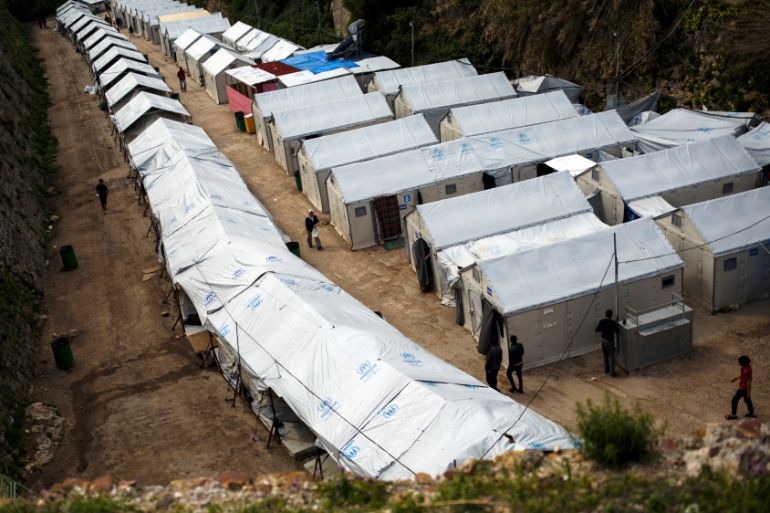Greece: Syrian man dies after suffering extensive burns
Refugee who sustained burns covering 85 percent of his body in Chios detention centre passes away in Athens hospital.

A Syrian man has succumbed to his wounds after sustaining extensive burns across his body last week in a Greek refugee camp, police and medical sources said on Saturday.
The refugee, identified by police as 27-year-old Ali Aamer, had suffered burns covering 85 percent of his body after a March 30 incident in the Vial detention centre in the eastern Greek island of Chios.
Keep reading
list of 4 itemsUK passes bill to deport asylum seekers to Rwanda: What’s next?
‘Can’t give them jobs’: Rwandans grapple with fears over UK asylum plan
UK passes law to send asylum seekers to Rwanda after months of wrangling
Videos posted on social media at the time showed the refugee – who was holding what looked like a fuel container and a lighter – being engulfed by flames, just moments after a tussle with a police officer who had grabbed him from behind in an apparent bid to stop him from setting himself on fire.
The police officer was also injured in the incident, suffering non-life threatening burns on seven percent of his hands and three percent of his face.
Aamer was initially admitted to the island’s Skilitseion Hospital and later transported to a specialised unit in the capital, Athens.
READ MORE: Spurned, hopeless and attacked, refugees’ drama goes on
He died a week later, on Thursday, police spokesman Theodoros Hronopoulos and a doctor at Athens’ Evangelismos hospital confirmed to Al Jazeera.
As of Saturday, his body was still at the hospital’s morgue, according to a staff member there.
‘Serious psychological burden’
The incident in Vial took place three days after the apparent suicide of another Syrian refugee in the Greek port of Piraeus, near Athens.
An estimated 62,000 refugees and migrants are currently stranded in mainland Greece and its islands following a wave of European border closures and a controversial deal between the European Union and Turkey in March 2016.
Under the agreement, migrants and refugees arriving in Greece without documents can be deported to Turkey if their asylum applications are rejected. But even if they do qualify for asylum, they face long delays as a result of complex procedures and a huge backlog.
Last month, in a statement marking the deal’s one-year anniversary, Save the Children and Doctors Without Borders said refugees stuck in Greek camps – including children as young as nine – are attempting suicide, cutting themselves and using drugs to deal with the “endless misery”.
The two international charities said anxiety, depression and aggression were on the rise in the camps, stressing that mental health was “rapidly deteriorating due to the conditions created” as a result of the EU-Turkey deal.
“Difficult living conditions coupled with uncertainty [about the future] have become a serious psychological burden for a number of refugees and migrants,” Roland Schoenbauer, spokesman for the United Nations’ refugee agency in Greece, told Al Jazeera.
Still, access to vital mental healthcare and support in Greece – where an ailing health system is drastically overburdened after years of deepening recession – is limited.
“The authorities should transfer people as fast as possible to decent accommodation on the mainland, and improve provisions for much-needed mental health services and psychosocial support,” Eva Cosse, Greece specialist at Human Rights Watch, told Al Jazeera.
“The European Commission should also ensure that the allocated aid benefits all refugees without discrimination, including people with psychosocial disabilities.”